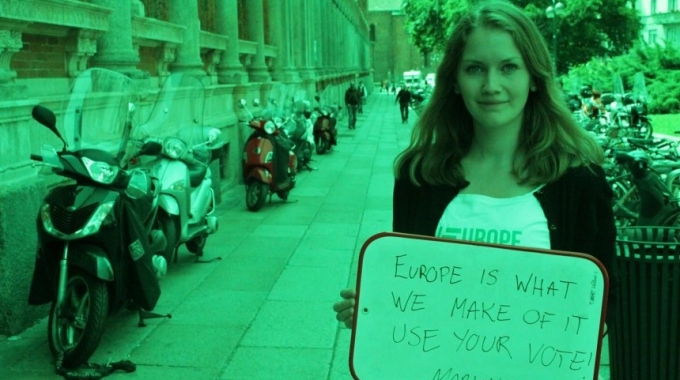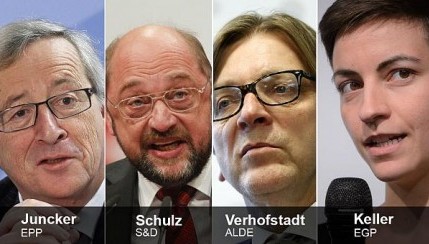
Despite being the biggest transnational election ever to take place, with around 400 million eligible voters from 28 different European countries, much of the focus of the run-up to the European Parliament elections was directed towards the concern that an increasing number of these 400 million voters would choose to stay home on election day. This particularly concerns young voters, where only 29 % cast their vote in 2009, a drop from the unimpressive 33 % in 2004. The young generation of Europe, which by some is even being referred to as the “lost generation”, has been described as disillusioned and almost indifferent to an election that many do not seem to know affects their everyday lives. As a volunteer for the MovEurope bus tour, I wanted to see for myself why the European democracy seems to be in such a bad shape.
For many of the young generation such border controls between neighbours seem ridiculous, and yet it was a reality in our very recent past.
By joining the bus tour through Italy, Spain, France and Belgium I was able to meet some of the young people most affected by the financial crisis, with over 50 % youth unemployment in Spain and over 40 % in Italy. Thus they would perhaps be the young people who could most likely fit the description as disillusioned and uninterested in the election. My impression was however the opposite. The majority of youth we talked to were not just interested; they had many thoughts and concerns for Europe and its future. Outside the University in Milan we handed out over 500 information leaflets in just a few hours. In Strasbourg we had families, some with three generations, participating in our activities and sharing their ideas on how to make a better Europe. A young woman in Strasbourg told me that “of course participating in the European Parliament elections are important, imagine needing a visa to cross the pedestrian bridge separating France from Germany.” For many of the young generation such border controls between neighbours seem ridiculous, and yet it was a reality in our very recent past.
Thanks to a dedicated team of local volunteers at each location, we were able to reach out to people in their own language and could engage them also on national and even local matters that impact their thoughts on the election. It’s somewhat ironic that despite the election being European, the campaigns in the different countries appeared to primarily concern national issues. At the last event in Brussels, one of the speakers pointed out that “the problem with Europe is that almost 90 % of policy is adopted at the European level, but 90 % of politics is still at the national level.” Without a European focus and sufficient information on European matters, it’s understandable that many young voters are unable to understand the impact of such an election and how they could contribute to change on the European level.
The young voters I talked to agreed that having even a tiny voice is a lot better than none at all.
As a Norwegian citizen I was not able to vote in the elections myself. This despite the fact that Norway in many ways are more integrated in the EU than some member states such as Great Britain and Denmark, thus leaving young people like me completely unable to use my vote to impact decisions concerning our common future. Confronted with this, the young voters I talked to agreed that having even a tiny voice is a lot better than none at all.
The European democracy might not be in very good shape, however the slight 0,9 % increase in voter turn-out, putting an end to a continuous decrease since the first election in 1979, might leave a small hope that more Europeans will realise the importance of participation in the future. Projects like the MovEurope bus tour are important contributions to making this happen.


